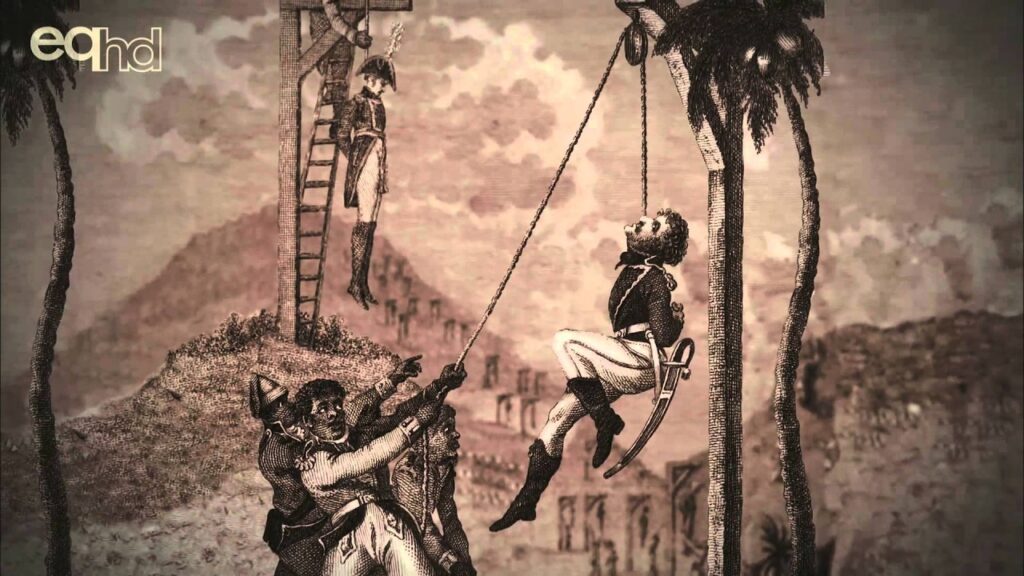The Haitian Revolution (French: Révolution haïtienne [ʁevɔlysjɔ̃ ajisjɛ̃n]), was a successful anti-slavery and anti-colonial insurrection that took place in the former French colony of Saint-Domingue that lasted from 1791 until 1804. It affected the institution of slavery throughout the Americas. Self-liberated slaves destroyed slavery at home, fought to preserve their freedom, and with the collaboration of mulattoes, founded the sovereign state of Haiti. It led to the greatest slave uprising since Spartacus’s unsuccessful revolt against the Roman Republic nearly 1,900 years prior.
The Haitian Revolution was the only slave uprising that led to the founding of a state free from slavery and ruled by non-whites and former captives. With the increasing number of Haitian Revolutionary Studies in the last few decades, it has become clear that the event was a defining moment in the racial histories of the Atlantic World. The legacy of the Revolution was that it challenged long-held beliefs about black inferiority and of the enslaved person’s capacity to achieve and maintain freedom. The rebels’ organizational capacity and tenacity under pressure became the source of stories that shocked and frightened slave owners.
François-Dominique Toussaint Louverture (French: [fʁɑ̃swa dɔminik tusɛ̃ luvɛʁtyʁ] 20 May 1743 – 7 April 1803), also known as Toussaint L’Ouverture or Toussaint Bréda, was the best-known leader of the Haitian Revolution. His military and political acumen saved the gains of the first Black insurrection in November 1791. He first fought for the Spanish against the French; then for France against Spain and Britain; and finally, for Saint-Domingue (modern Haiti)’s colonial sovereignty against Napoleonic France. He then helped transform the insurgency into a revolutionary movement, which by 1800 had turned Saint-Domingue, the most prosperous slave colony of the time, into the first free colonial society to have explicitly rejected race as the basis of social ranking.
Though Toussaint did not sever ties with France, his actions in 1800 constituted a de facto autonomous colony. The colony’s constitution proclaimed him governor for life even against Napoleon Bonaparte’s wishes. He died betrayed before the final and most violent stage of the armed conflict. However, his achievements set the grounds for the Black army’s absolute victory and for Jean-Jacques Dessalines to declare the sovereign state of Haiti in January 1804. Toussaint’s prominent role in the Haitian success over colonialism and slavery had earned him the admiration of friends and detractors alike.
Toussaint Louverture began his military career as a leader of the 1791 slave rebellion in the French colony of Saint-Domingue; he was by then a free black man and a Jacobin. Initially allied with the Spaniards of neighboring Santo Domingo (modern Dominican Republic), Toussaint switched allegiance to the French when they abolished slavery. He gradually established control over the whole island and used political and military tactics to gain dominance over his rivals. Throughout his years in power, he worked to improve the economy and security of Saint-Domingue. He restored the plantation system using paid labour, negotiated trade treaties with Britain and the United States, and maintained a large and well-disciplined army.
In 1801, he promulgated an autonomist constitution for the colony, with himself as Governor-General for Life. In 1802 he was forced to resign by forces sent by Napoleon Bonaparte to restore French authority in the former colony. He was deported to France, where he died in 1803. The Haitian Revolution continued under his lieutenant, Jean-Jacques Dessalines, who declared independence on January 1, 1804. The French had lost two-thirds of forces sent to the island in an attempt to suppress the revolution; most died of yellow fever.

